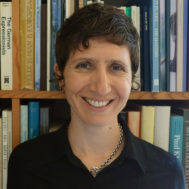
October 16, 2018
By Rosalie Z. Fanshel
Rosalie Z. Fanshel is the Program Manager at the Berkeley Food Institute.
As science PhD students at UC Berkeley, Aidee Guzman and Kripa Jagannathan spend a lot of time in the lab analyzing data. Yet their work also involves many hours walking through fields with farmers in California’s Central Valley. With an interest in applied research and outreach, both took part in the innovative Graduate Students in Extension program (GSE), a collaborative pilot project of the UC Division of Agriculture and Natural Resources and UC Berkeley College of Natural Resources. The goal of the pilot is to train and recruit graduate students to become next generation of Cooperative Extension Specialists and Advisors. Cooperative Extension is the outreach arm of the University of California, tasked with helping the public solve real-world problems in agriculture, the environment, and human and community well-being. 280 cooperative extension specialists and advisors work on the ground in every county of California, providing evidence-based programming to Californians while also communicating the state’s research needs back to the university.
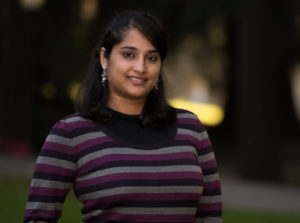
Kripa Jagannathan. Photo by CS Sharada Prasad.
As a 2015 GSE Fellow, Kripa Jagannathan (PhD Candidate, Energy and Resources Group), set out to evaluate the usability of climate science for adaptation planning in agriculture and water management, with a focus on perennial tree crops. For Kripa, research and extension are not separate pursuits. Through interviews, focus group discussions, and workshops with California almond farmers and water utilities officials, she set out to understand the types of climate information that practitioners need, and whether current scientific research is meeting those needs. Kripa learned that almond growers have in fact experienced changes in climate over the past few decades, yet current climate projection tools don’t address crop-specific climate information such as future changes in chill hours and frost patterns. After receiving this feedback she started another project to evaluate how well climate models are able to predict chill hours. She is working with Lawrence Berkeley Lab and the California USDA Climate Hub on further research to develop these decision-relevant tools.
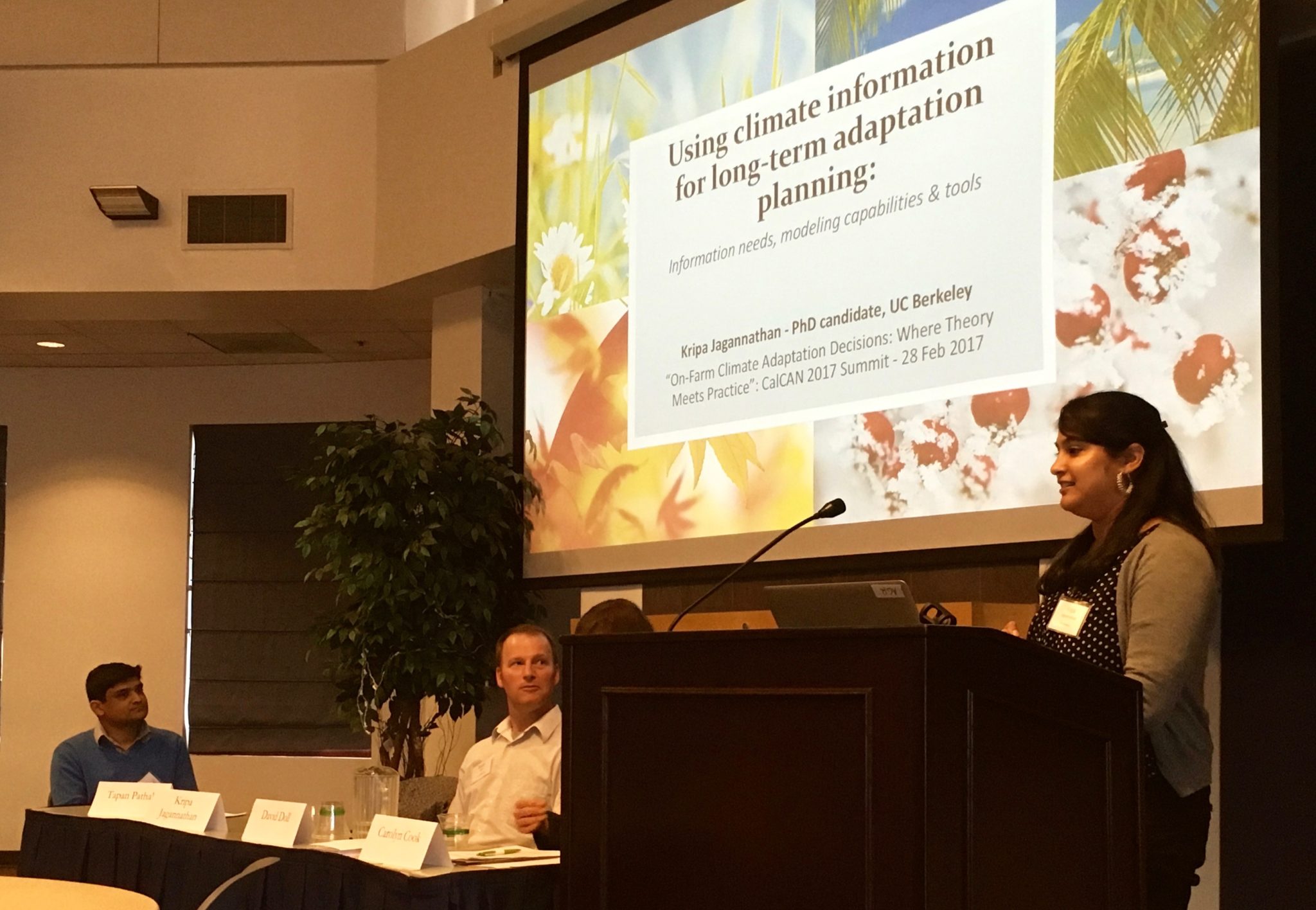
Kripa presenting at the CalCAN 2017 summit with David Doll and Tapan Pathak. Photo by Alana Siegner.
Through the Graduate Student in Extension program Kripa received close mentorship from Tapan Pathak, UC Merced Extension Specialist in Climate Adaptation in Agriculture, and David Doll, a Merced County Pomology Farm Advisor. She continues to work with her mentors; together they have offered workshops for both almond and table grape growers on how to use climate information tools, and presented at the 2017 California Climate and Agriculture Network summit (see their presentation here).
Kripa is now wrapping up her doctoral work and applying to positions including those with cooperative extension. She is determined to continue to get climate information to the people who can use it and simultaneously bring stakeholders’ experiential knowledge to the scientific community. Her advice to other PhD students? Build your research questions from the grounded experience of practitioners. “Start doing this early on. It can be intimidating to speak with farmers when you are still learning the science, but do a few pilot interviews and seek mentorship from academic and extension advisors. Don’t focus too much on having perfect questions, you never will. Start with broad questions and focus on building a relationship with your interviewee. Listen carefully with an open mind to pick up clues on what is important to them so that you have a meaningful conversation.”
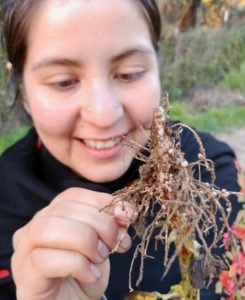
Aidee Guzman. Photo by Rodolfo Huerta.
2017 GSE Fellow Aidee Guzman (PhD Candidate, Environmental Science, Policy, and Management) works with small scale farmers in her native Fresno County. With mentorship from Fresno County Small Farms Advisor Dr. Ruth Dahlquist-Willard, Aidee’s project aimed to help Hmong and Latinx farmers by measuring soil nutrient content on their farms so that they can successfully fulfill reporting requirements from the Irrigation Regulatory Board. Aidee’s work during her fellowship has now become part of her dissertation. She studies the correlation between diversified farming systems—some farmers in her study grow over 100 different food plants—and the level of arbuscular mycorrhizal fungus present in the soil. High levels of this fungus can be an indicator of soil health. She is also interested in the connection between pollinators and healthy soil microbial communities, and how plant nutrient uptake effects pollen and nectar quality and quantity available for pollinators.
Aidee continues to work with Dr. Dahlquist-Willard and other Fresno County advisors, including Sam Vang of the USDA Natural Resources Conservation Service; just this week they offered an on-farm workshop on soil biodiversity and farming practices. Aidee is also a fellow on the Berkeley Food Institute/Center for Diversified Farming Systems project “Promoting Soil Health Innovations,” for which she will interview immigrant and refugee farmers who are managing a high diversity of crops to understand their perspectives and insights on soil health.
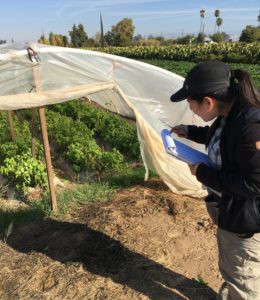
A crop diversity survey at a farm site in Fresno. Photo by Rodolfo Huerta.
The GSE program was not Aidee’s first exposure to Cooperative Extension. As an undergrad at the University of Wisconsin-Madison she had worked with an extension specialist on applied research on pollination. While UC Berkeley was the first west coast land-grant institution—the federally-designated universities that provide extension services—not many students at our urban campus are aware of these opportunities. Aidee encourages Berkeley students to get outside the Bay Area and learn the nuances that only applied research offers. She says, “People tend to think of Fresno as monocultural landscape, polluted, one of the poorest counties. I see the farmers I work with as glimmers of hope in a degraded landscape. Fresno is not just a poster child for the worst aspects of agriculture. It is a resilient community.”